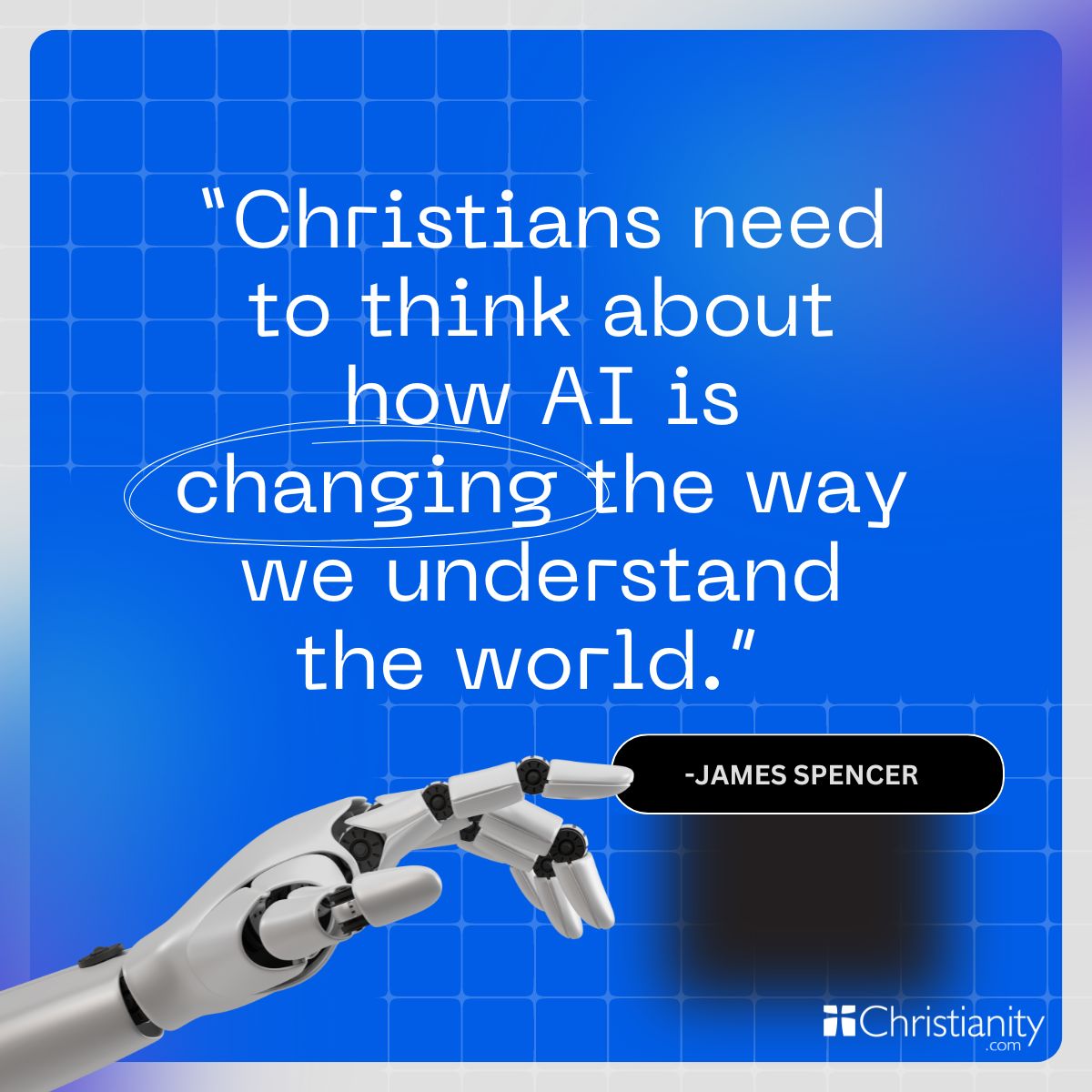
I have been (and continue to be) concerned with certain aspects of artificial intelligence (AI). Yet, apart from divine intervention of some sort, AI seems to be inevitable. As such, there is a need for Christians to understand this new technology and to develop theological frameworks for its use in Christian settings. The following offers some of my own thoughts regarding AI use and the distinctiveness of humankind that AI may push us to realize.
Photo Credit: ©GettyImages/diego_cervo

Why AI Will Never Think Exactly Like Humans (and Why it Matters)
While we often think about our thought (or interior) life as separate from our embodied (or exterior) life, a growing field of research, often referred to as embodied cognition, suggests that our thoughts, reasoning, and understanding are rooted in our interactions with the physical world. Our needs, the resources available to us, and the structures and people we encounter significantly influence how we think. While embodies cognition is far from a settled field of research, we would be unwise to ignore the connection between embodiment, or how we, as bodily beings, think about the world around us.
For instance, my wife and I were taking a long weekend away in Chicago. At around 10:30 pm, I suggested we walk to Lake Michigan. As we walked, my wife made the comment that walking at night wasn’t something she ever considered doing while traveling alone. For some reason, at that moment, the comment hit home. I hadn’t thought twice about suggesting a walk to the lake. I would have taken the walk by myself. As a six-foot, two-hundred-plus pound human, I don’t have the same concerns as my wife, who, by any measure, would be considered petite. Though I’m not ignorant of the dangers associated with walking in a city at night, I don’t “know” them in the same way that my wife does. Our different ways of embodying the world change the way we perceive the situations in which we find ourselves.
As a separate example, my son recently reminded me of a guided mountaineering trip we took while visiting Utah. At one point, we were led through a narrow crevice. While I’m willing to bet that the guide knew I could make it through, I was extremely uncomfortable doing so. Unlike my wife and kids who were half my weight at the time, there were moments when my chest and back were touching opposite sides of the crevice. My size was a detriment in the situation. While my family may have “felt for me” or been concerned that I would get stuck at some point, none of them “knew” that situation how I knew it.
Embodiment is one of the primary reasons that AI will never think exactly like humans.
Even though humanoid robots are more common than they are today, they won’t experience the world in the same way we do. They won’t “know” in the same way that we know. They may be able to “parrot” some of their experiences quite well, but I suspect there will always be some remainder. An AI-powered robot won’t have the same needs as we do, feel the same fears, or take pleasure in the same experiences. As such, they will remain artificial.

So what? Does it really matter that AI will have a different perspective on the world than humans? Not necessarily. If AI can “artificially” reproduce our experience such that we can’t tell the difference, it is reasonable to assume that the information it provides would not be so skewed as to be unusable. AI, if nothing else, will be good at mimicking us.
Noticing the way embodiment changes our perspective, however, isn’t just about what sort of information AI can provide. It is also about the fact that it provides it. To put it differently, AI is changing our environment. It is a new element. As such, it will impact the way we engage with the world around us. By changing our environment, it will also change the way we think. This change in thinking will likely enhance and diminish our ability to accomplish our basic human task of pointing to and glorifying the Triune God.
Christians need to think about how AI is changing the way we understand the world.
Photo Credit: ©GettyImages/Bearinmind

Understanding the World
In The Matter With Things, Iain McGilchrist notes,
“We take the success we have in manipulating it [the world] as proof that we understand it. But that is a logical error: to exert power over something requires us only to know what happens when we pull the levers, press the button, or utter the spell…It is hardly surprising, therefore, that while we have succeeded in coercing the world to our will to an extent unimaginable even a few generations ago, we have at the same time wrought havoc on that world precisely because we have not understood it.”
AI is a lever, a button, or a spell. It allows us to “manipulate” the world in ways we previously could not. However, such manipulations do not necessarily reflect an understanding of the world’s most fundamental dynamic: human dependence on and allegiance to the Triune God.
Whatever we may be able to accomplish via AI or some other technology doesn’t change the fact that we need a Savior. It doesn’t change the fact that discipleship helps us not to manipulate the world but to understand it. Discipleship is the process of learning how to live according to that understanding. In doing so, we may very well fail to fix what is wrong with the world because discipleship is not a strategy for fixing the world but for living faithfully in a world so broken only God can fix it. Faithful living requires engagement…it cannot be done in isolation; however, discipleship orients us to the world so that we do not assume that faithful living will result in outcomes that the world would recognize as “success.”
As Joseph L. Mangina notes in his comments regarding Revelation 13, just because the church does not “embrace the beast’s criteria for what constitutes success” does not mean that the church should adopt an “indifference to success as such, at the level of what might be called tactics.” Instead, just as “Christians make no fetish of failure,” we make no fetish of success either because we recognize “that success must not come at the expense of Christian faithfulness in a world dominated by the powers.”
Because Christians understand the world and the God who made it, we are not driven by a desire to manipulate the world but to live in a manner that points to and glorifies the Triune God, even when doing so means that we suffer loss.
This understanding, conveyed in the gospel and forged in discipleship, is crucial to the Christian faith. When we find ourselves obsessed with pulling levers and pressing buttons to pursue some agenda (however legitimate it may be), we need to consider that we are promoting a misunderstanding of how the world works. We may be promoting a picture of God that makes him look suspiciously like us when we are to be increasingly conformed to the image of Christ.
Photo Credit: ©GettyImages/Pamela D McAdams

Perceiving the World
AI will allow us to speed up our lives and our work. It will allow us to “outsource” some of our cognitive load. In certain instances, losing that load may be useful. Yet, AI can’t free us from reality.
AI is no threat to God’s sovereignty (or even his omniscience).
It doesn’t make God superfluous or challenge God’s order. Even though our understanding of God, ourselves, others, and the world remains stable, AI certainly has the potential to alter the way we perceive reality and, as such, the way we end up living in the world.
Photo Credit: Annie Spratt/Unsplash

3 Ways AI Can Influence Our Perception of Reality
First, as I’ve argued elsewhere, AI can change perception through information bias. AI is not, as is sometimes claimed, free from bias...it may be emotionless, but that does not mean it is not subject to the sorts of bias common to all those who communicate with others. For instance, selecting what information to include in a response (and, by default, what information not to include) is a staple in all communication (whether human or AI). Selection requires discernment…a sort of discrimination…in which one perspective or piece of information is deemed more relevant than another.
It doesn’t matter how “smart” an AI gets. It will always have “bias” simply because it cannot communicate exhaustively and must choose what information is most relevant to a given situation.
Second, while selection is an inherent bias, there is also the problem of deep fakes and the dissemination of false information that, for all intents and purposes, seems true. As if we needed more help promoting falsehood, AI has the capacity to replicate images and voices such that it may actually appear an event occurred when it actually didn’t. There is a real danger (driven by a combination of the technology and bad actors) that we will be incapable of distinguishing fiction from non-fiction in certain situations.
Finally, the existence of AI can change the way we perceive reality. Whereas the previous points focus on the information AI provides, this one focuses on AI itself. It’s very presence in the world can change the way we perceive reality and interact within the world. This is not unique to AI. It is a feature of all sorts of technologies. As Ritzer notes in The McDonaldization of Society, “McDonaldization” depends on a rational system characterized by “efficiency, predictability, calculability, and control through nonhuman technology.” The trouble is, as Ritzer notes, “rational systems inevitably spawn irrationalities…rational systems serve to deny human reason; rational systems are often unreasonable.”
AI has the potential to arrange human activity in ways other technologies don’t. Tasks that were previously performed by humans (and could only be performed by humans) can now be done through AI. The nonhuman system is rational. It is difficult to argue against the efficiencies AI models can provide. AI models are getting increasingly predictable and reliable. AI seems to be getting to the point that it will be able to do pretty much anything a human could do in a fraction of the time. Rationally speaking, getting something done faster, cheaper, and with fewer errors seems like a good idea. The trouble is that our inefficiencies are often necessary to form and shape us in important ways.
Efficiency, then, can hold us back as it pushes us forward because it reduces the sort of struggles that can lead to an enduring sense of contentment and meaning.
As Gad Saad suggests, “Life can be tough, but adversity can drive us to succeed, and that very effort can make us happy.” Efficiency, at some point, becomes detrimental because we need the difficulties inefficiency tends to provide in order to develop our own character.
Photo Credit: ©iStock/Getty Images Plus/tommaso79

4 Theological Questions for AI Use
My concerns about AI haven’t changed much since beginning to research and write on AI in theological perspective a little over a year ago. Christians need to think more carefully about how technologies, including AI, take away from or devalue human interactions, minimize struggles that would help us grow and mature in Christ, and create downsides for some that we deem “acceptable” because of the “upside” we are experiencing. I don’t see those concerns going away anytime soon. That said, I’ve also been exposed to AI models that seem highly beneficial.
As I have used some of the AI models personally and begun to implement some of them into my various ministries, I’ve developed the following preliminary set of questions to help me evaluate whether to use AI in a given instance.
Photo Credit: ©Getty Images /Delmaine Donson

1. Am I Eliminating Potentially Formative Effort in Using AI to Complete This Task?
I do a fair amount of writing. While it has been tempting to use AI to create text-based materials, I’ve opted not to use AI to create initial drafts of my work. However, I have been using AI to develop summaries and outlines, to create learning outcomes based on my writing, and to identify the ideas that are emphasized in my work. In doing so, I am able to “check” what I’ve written. AI gives me a source outside of my own brain that can evaluate my work and offer a form of feedback on how well I’ve communicated what I had intended to communicate. Using AI in this way allows me to benefit from the effort associated with writing apart from AI while also allowing me to refine my work through the use of AI.
Photo Credit: Glenn Carstens Peters/Unsplash

2. Could This Task Be Feasibly Accomplished without AI?
Kahnmigo is probably one of the best examples of an AI model allowing for something (i.e., personalized learning assistance) that couldn’t feasibly accomplished without AI. One-on-one tutoring has shown stronger learning outcomes than group instruction by one or two standard deviations depending on the sort of group instruction utilized, yet it simply hasn’t been possible to provide every student a tutor. AI makes that more possible.
It seems to me that something similar could be accomplished for Christian education. While we can never eliminate human interaction in the process of discipleship or even in learning doctrine, AI offers some interesting advantages over, for instance, simply reading a book or an article. With the right design and boundaries, Christians could have a more interactive experience than they would simply reading a book, listening to a podcast, or watching a video. While this can be accomplished in a classroom (in-person or virtual), classrooms have their limitations (e.g., conflicting meeting times, more and less talkative participants, class sizes, etc.). As a means of supplementing more traditional ways of learning, AI has promise that might not be realized in other ways.
Photo Credit: ©iStock/Getty Images Plus/AndreyPopov

3. Are People Willing and Able to Put Forth the Effort to Complete a Particular Task without AI?
The D. L. Moody Center’s digital archive project has been up and running for a little over six years now. The archives consist of searchable digital scans of old letters and papers paired with transcriptions of those letters and papers. While several scholars use the digital archives regularly, they can be difficult for those without some previous knowledge of Dwight Moody and his context to access. Wading through the letters and papers can be quite beneficial, but it isn’t immediately clear for most that the effort is worth the payoff.
However, pairing the archives with an AI would allow anyone to benefit from the information it contains. The AI does the harder work of reading through the various transcriptions while the user can ask questions and get at that information quickly and easily. In other words, they get the benefit of the contents of the archives that might otherwise have been inaccessible due to the degree of effort required to study the archives previously.
Photo Credit: ©Getty Images/Fizkes

4. Am I Using AI Interaction to Avoid Human Interaction?
This final question doesn’t have a specific example. It is a question that needs to be asked continuously. If we use AI as an excuse to distance ourselves from one another or if AI becomes our default mode of “interaction,” we need to rethink our use of it. Human interaction is something we cannot set aside. We need to leave room for one another.
As AI becomes an increasingly common part of our lives, we need to be cautious about how we use AI. The set of questions above is far from complete, but my hope is that they will provide a helpful starting point for reflection about our use of AI. As Christians, we need to remain sober as we consider the value of AI and other technologies while allowing the deep, effortful work of discipleship to orient us to the world so that we can point to and glorify the Triune God.
What are your thoughts on AI, and how it should be used? Comment and share your thoughts and testimony at Crosswalk Forums! Click HERE.
Photo Credit: ©iStock/Getty Images Plus/Supatman

Originally published Wednesday, 09 October 2024.
